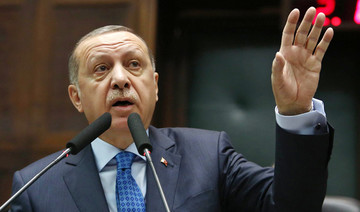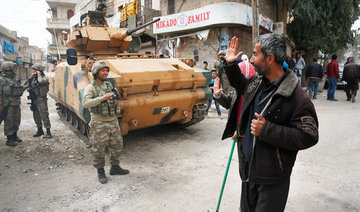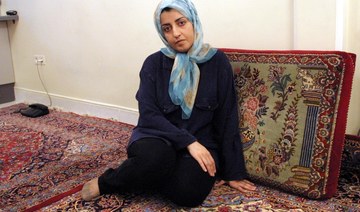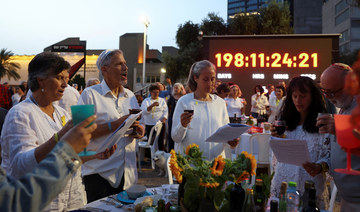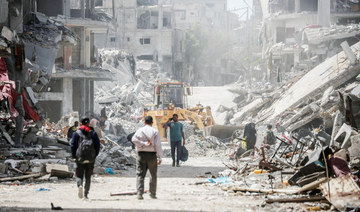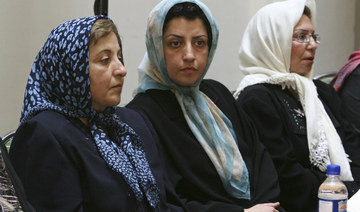ANKARA: Turkey announced a curfew in Syria’s northern city of Afrin as part of a wide-ranging operation against a rebel faction, the Al-Sharqiyyah Martyrs Gathering, and its allies who have been accused of crimes including kidnapping civilians, robbery, extrajudicial executions and looting.
The Syrian Observatory for Human Rights, the UK-based monitoring group, announced: “Turkish forces and the factions closed the roads leading to Afrin city and surrounded several neighborhoods of the city, while the heaviest clashes are concentrated in the middle of Afrin city in Al-Villat Street.”
The Observatory said at least 25 men were killed in clashes.
The operation was reportedly conducted under the supervision of the Turkish army, which provided logistic support.
The Observatory also told of a sweeping search campaign by the Turkish special task forces in Afrin, along with information about “preparations for raiding the headquarters of Al-Sharqiyyah Gathering, most of whose fighters are descended from Deir Ezzor province, which handed over its weapons days ago after its objection to the Turkish orders.”
Al Sharqiyyah headquarters are in the Al-Filat and Al-Mahmoudiya areas, and the Al-Nayrouz crossroads in Afrin.
Turkey launched Operation Olive Branch in January this year and concluded it in April with the support of the Free Syrian Army to clear the region of Syrian Kurdish YPG militants, which it sees as a terror group.
In the wake of Operation Olive Branch, thousands of people are thought to be returning to the city, while trade and economic activities, as well as educational and health services, have begun to return to normal under the supervision of a 1,700-strong police force which has been trained in Turkey to patrol the streets.
Therefore, maintaining order and security by rooting out lawlessness in a city whose population has reached 200,000 from 50,000 is crucially important for Ankara to prove its success.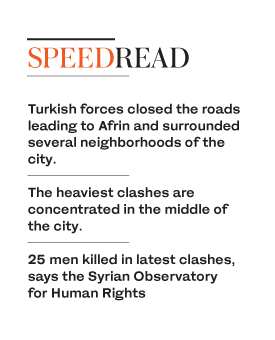
Nicholas Heras, Middle East security fellow at the Center for a New American Security in Washington, said Turkey may be a victim of its own success in Afrin.
“Turkey’s rapid conquest of Afrin was the result of the Turkish military’s competence, not because Turkey’s Syrian partner forces were effective on their own,” he told Arab News.
According to Heras, the Syrian partner force that Turkey mobilized to run Afrin is divided among different groups, and many of these groups act with a mercenary mentality because they stay in Afrin for the money that Turkey gives them.
“Many of the Syrian groups in Afrin are not capable of stopping the YPG-led insurgency there, and are divided among themselves about which group will profit the most from their partnership with Turkey,” he noted.
With partners like this, Heras thinks that the Turkish military will have to take a different approach, which is to have a firmer handle on Afrin.
“This in many ways defeats the purpose of having Syrian partner forces on the ground, because they are supposed to do most of the work, not create problems that makes it more painful for Turkey to control Afrin,” he said.
The Observatory claims that Turkey’s ongoing operation against the groups in Afrin has been supported by the Hamza Division, the Sultan Murad Division, the Al-Sham Corps and the 3rd Corps.
For some people the operation is against the irregularities and the corruption of Al-Sharqiyyah Martyrs Gathering, composed of more than 800 members. Some local reports claim that the real motivation behind the Turkish operation is linked to the fact that this group is disobeying Ankara’s orders not to fight against the regime forces.
For this narrative, this operation was launched for keeping Turkish proxies on the ground under control.
Last July, Al-Sharqiyyah Martyrs Gathering, led by its commander named “Abu Khula,” incurred Turkey’s anger for launching an unauthorized attack on the Syrian Arab Army in the village of Tadef in the northern Aleppo countryside and just south of the Turkish-held city of Al-Bab. The attack was a violation of the Russian-Turkish-Iranian de-escalation agreement in northern Syria.
Mete Sohtaoglu, an independent researcher on the Middle East, said his local sources confirmed around 40 deaths after an intense offensive on Sunday.
“The remaining fighters of Al-Sharqiyyah will lay down arms and will return to Idlib with their families,” he told Arab News. “Turkey is making sure the peace in Afrin is not compromised.
“Such operations have been conducted occasionally in the past, but this time the final goal was to dissolve this group. I assume that all rebel groups in Afrin will be liquefied soon and brought under the auspices of the new Syrian National Army umbrella group,” Sohtaoglu said.
Although Al-Sharqiyyah announced in late October that it was disbanding voluntarily, it has never implemented this decision and has continued to carry out insubordination and crimes.
This operation is considered the first all-out campaign waged by pro-Ankara rebel groups against another faction in the city.
The security operation is not restricted to Afrin, but also covers other areas of the Euphrates Shield in the rebel-held territory of eastern Aleppo that was captured by Turkish-backed groups.
Ankara-backed groups launch offensive against criminal gang in Afrin
Ankara-backed groups launch offensive against criminal gang in Afrin
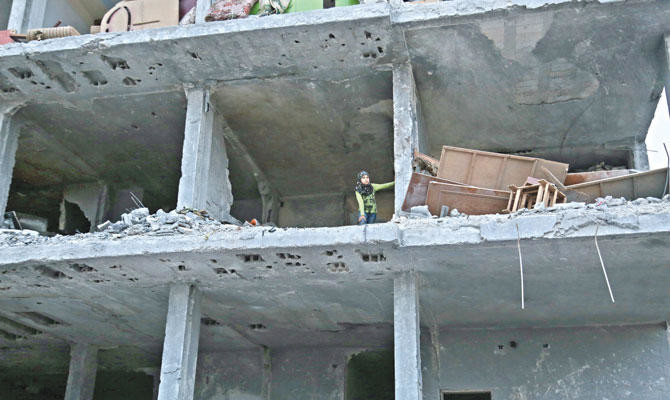
- “Many of the Syrian groups in Afrin are not capable of stopping the YPG-led insurgency there, and are divided among themselves
Tent compound rises in Khan Younis as Israel prepares for Rafah offensive
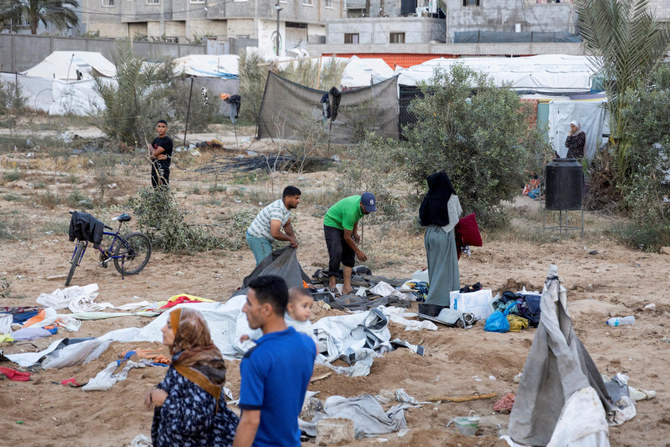
- Israel has said it plans to evacuate civilians from Rafah during an anticipated offensive on the southern city
- The Israel-Hamas war has killed more than 34,000 Palestinians
The tent construction is near Khan Younis, which has been targeted by repeated Israeli military operations over recent weeks. Israel has said it plans to evacuate civilians from Rafah during an anticipated offensive on the southern city, where hundreds of thousands of people have taken refuge during the war, now in its seventh month.
Also Monday, a failed rocket strike was launched at a base housing US-led coalition forces at Rumalyn, Syria, marking the first time since Feb. 4 that Iranian-backed militias have attacked a US facility in Iraq or Syria, a US defense official said. No personnel were injured in the attack, and no group has claimed responsibility for the attack.
The conflict has sparked regional unrest pitting Israel and the US against Iran and allied militant groups across the Middle East. Israel and Iran traded fire directly this month, raising fears of all-out war.
The war was sparked by the unprecedented Oct. 7 raid into southern Israel in which Hamas and other militants killed around 1,200 people, mostly civilians, and abducted around 250 hostages. Israel says militants are still holding around 100 hostages and the remains of more than 30 others.
The Israel-Hamas war has killed more than 34,000 Palestinians, according to local health officials, at least two-thirds of them children and women. It has devastated Gaza’s two largest cities and left a swath of destruction. Around 80 percent of the territory’s population have fled to other parts of the besieged coastal enclave.
The US House of Representatives approved a $26 billion aid package on Saturday that includes around $9 billion in humanitarian assistance for Gaza, which experts say is on the brink of famine, as well as billions for Israel. The US Senate could pass the package as soon as Tuesday, and President Joe Biden has promised to sign it immediately.
Iran’s foreign minister calls EU sanctions ‘regrettable’
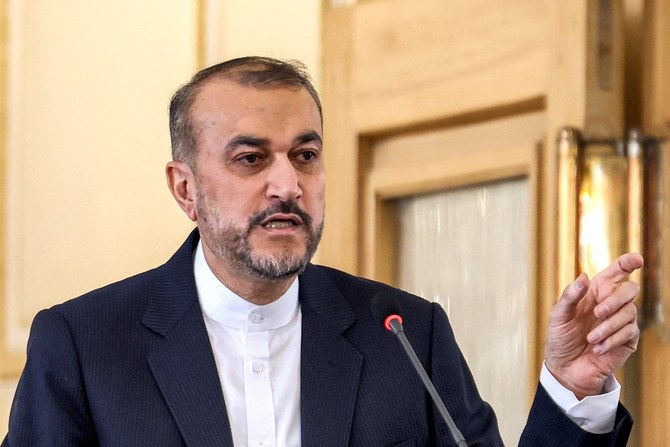
- EU foreign ministers agreed in principle to expand sanctions on Iran by agreeing to extend restrictive measures on Tehran’s weapons exports
DUBAI: European Union sanctions announced following Iran’s attack against Israel are “regrettable” because the country was acting in self-defense, Iran’s Foreign Minister Hossein Amirabdollahian posted on X on Tuesday.
Iran launched more than 300 drones and missiles on Israel in what it said was retaliation against a suspected Israeli bombing of its embassy compound in Damascus.
On Monday, EU foreign ministers agreed in principle to expand sanctions on Iran by agreeing to extend restrictive measures on Tehran’s weapons exports of any drone or missile to Iranian proxies and Russia.
“It is regrettable to see the EU deciding quickly to apply more unlawful restrictions against Iran just because Iran exercised its right to self-defense in the face of Israel’s reckless aggression,” Amirabdollahian said on X, before calling on the EU to apply sanctions on Israel instead.
More work will need to follow in Brussels to approve a legal framework before the expansion of the sanctions can take effect.
Israel’s Gaza war has negatively impacted human rights, says US report

- Rights issues include credible reports of unlawful killings, enforced disappearances and torture, says report
- Israeli military's conduct has come under scrutiny as its forces have killed over 34,000 in Gaza since Oct. 7
WASHINGTON: The war between Israel and Hamas that has killed tens of thousands of Palestinians in Gaza and resulted in a severe humanitarian crisis has had “a significant negative impact” on the human rights situation in the country, the US State Department said in its annual report on Monday.
Significant human rights issues include credible reports of arbitrary or unlawful killings, enforced disappearance, torture and unjustified arrests of journalists among others, said the State Department’s 2023 Country Reports on Human Rights Practices.
The report added that the Israeli government has taken some credible steps to identify and punish the officials who may have been involved in those abuses.
Israel’s military conduct has come under increasing scrutiny as its forces have killed 34,000 Palestinians in Gaza, according to the enclave’s health authorities, many of them civilians and children. The Israeli-occupied Gaza Strip has been reduced to a wasteland, and extreme food shortages have prompted fears of famine.
Israel launched its assault in response to a Hamas attack on Oct. 7, in which Israel says 1,200 people were killed.
Rights groups have flagged numerous incidents of civilian harm during the Israeli army’s offensive in Gaza, as well as raised alarm about rising violence in the Israeli-occupied West Bank, where Palestinian Health Ministry records show Israeli forces or settlers have killed at least 460 Palestinians since Oct. 7. But so far the Biden administration has said it has not found Israel in breach of international law.
Washington gives $3.8 billion in annual military assistance to its longtime ally. Leftist Democrats and Arab American groups have criticized the Biden administration’s steadfast support for Israel, which they say provides it with a sense of impunity.
But this month, President Joe Biden for the first time threatened to condition support for Israel, and insisted that it take concrete steps to protect humanitarian aid workers and civilians.
Israel’s Gaza war has negatively impacted human rights, says US report
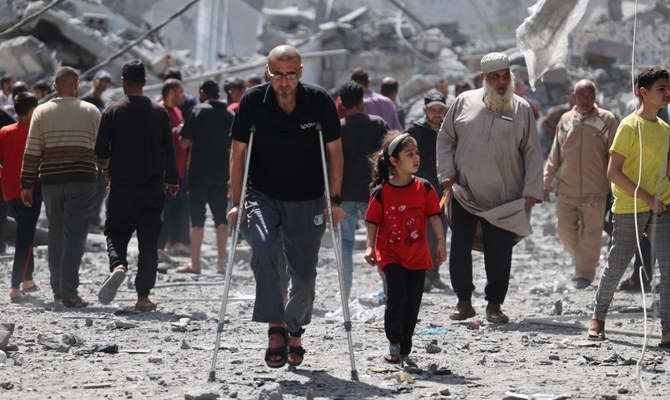
- The Israeli-occupied Gaza Strip has been reduced to a wasteland, and extreme food shortages have prompted fears of famine
WASHINGTON: The war between Israel and Hamas that has killed tens of thousands of Palestinians in Gaza and resulted in a severe humanitarian crisis has had “a significant negative impact” on the human rights situation in the country, the US State Department said in its annual report on Monday.
Significant human rights issues include credible reports of arbitrary or unlawful killings, enforced disappearance, torture and unjustified arrests of journalists among others, said the State Department’s 2023 Country Reports on Human Rights Practices.
The report added that the Israeli government has taken some credible steps to identify and punish the officials who may have been involved in those abuses.
Israel’s military conduct has come under increasing scrutiny as its forces have killed 34,000 Palestinians in Gaza, according to the enclave’s health authorities, many of them civilians and children. The Israeli-occupied Gaza Strip has been reduced to a wasteland, and extreme food shortages have prompted fears of famine.
Israel launched its assault in response to a Hamas attack on Oct. 7, in which Israel says 1,200 people were killed.
Rights groups have flagged numerous incidents of civilian harm during the Israeli army’s offensive in Gaza, as well as raised alarm about rising violence in the Israeli-occupied West Bank, where Palestinian Health Ministry records show Israeli forces or settlers have killed at least 460 Palestinians since Oct. 7. But so far the Biden administration has said it has not found Israel in breach of international law.
Washington gives $3.8 billion in annual military assistance to its longtime ally. Leftist Democrats and Arab American groups have criticized the Biden administration’s steadfast support for Israel, which they say provides it with a sense of impunity.
But this month, President Joe Biden for the first time threatened to condition support for Israel, and insisted that it take concrete steps to protect humanitarian aid workers and civilians.
Nobel laureate urges protest against Iran’s ‘war on women’
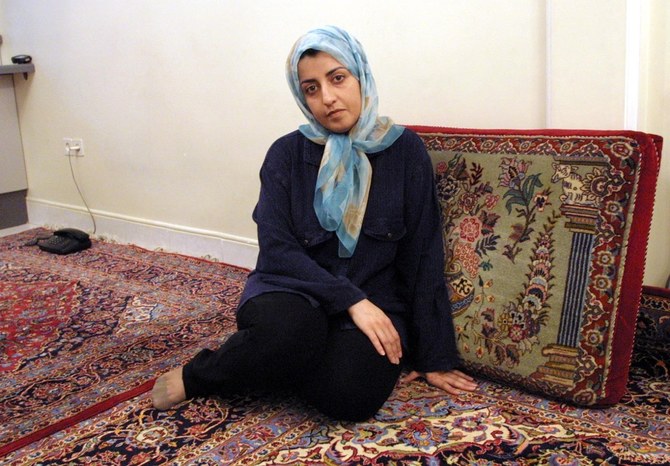
- Narges Mohammadi issues plea from Evin prison amid new crackdown by Tehran’s morality police
JEDDAH: Jailed Iranian Nobel laureate Narges Mohammadi urged Iranians on Monday to protest against the clerical regime’s “war against women” amid a new crackdown forcing women to cover their heads.
Mohammadi, who is being held in Evin prison in Tehran, called on Iranian women to share their stories of arrest and sexual assault at the hands of the authorities.
Iran launched a nationwide operation this month to enforce the wearing of the headscarf. Women have been arrested and taken to police stations by the morality police, and the Farsi hashtag meaning “war against women” has been trending on social media.
“People of Iran, I ask you, artists, intellectuals, workers, teachers, and students ... inside and outside the country to protest against this war against women,” Mohammadi said in a message from inside the prison. “Do not underestimate the power of sharing your experiences. Doing so will expose the misogynistic government and bring it to its knees.” She accused the authorities of bringing “a full-scale war against all women to every street in Iran.”
Mohammadi said she had been joined in jail by Dina Ghalibaf, a journalist and student who was arrested after accusing security forces on social media of putting her in handcuffs and sexually assaulting her during a previous arrest at a metro station. “For years, we have witnessed many women who have endured assault, abuse, and beatings by government agents,” Mohammadi said.
Mohammadi, 52, was awarded the Nobel Peace Prize last year in recognition of her campaign for human rights in Iran, which has led to her spending much of the past two decades in and out of jail. She has been imprisoned since November 2021 and has not seen her husband and twin children, who live in Paris, for several years.


